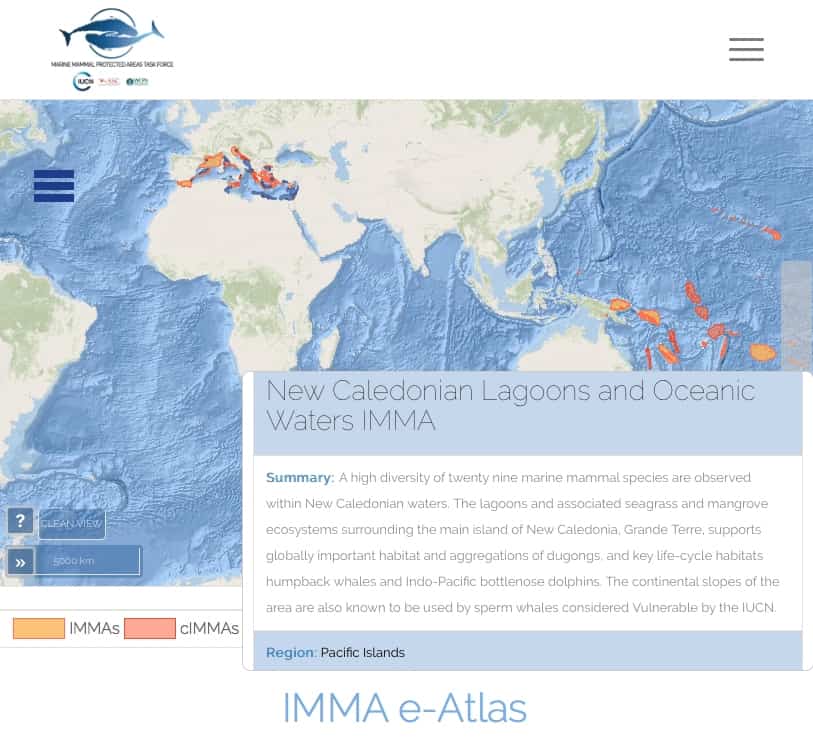The IUCN Marine Mammal Protected Areas Task Force invites national governments and the public to learn more about exciting developments in the identification of marine mammal habitats in the Mediterranean and in the Pacific Islands regions.
- Join us for coffee at a side event at the CMS CoP (Convention on Migratory Species Conference of the Parties, Manila, Philippines) to find out about a CMS Important Marine Mammal Area (IMMA) resolution to be put forward and about year two results of the Task Force’s six-year project to identify IMMAs. The side event “IMMAs to Support CMS Goals” will be held Tuesday 24 Oct. (13.45-14.30) at the Philippine International Conference Centre, Manila, in Meeting Room 7, and is open to all CoP attendees.
- At the same time, the initial IMMA results are being released to the public on a dedicated website which features the first e-Atlas for Important Marine Mammal Areas.

IMMA Maps completed in the Mediterranean and Pacific Islands
In Oct. 2016, at the close of the first IMMA expert workshop in Chania, Greece, 41 candidate Important Marine Mammal Areas (cIMMAs) were presented by experts for consideration. From this list, 26 IMMAs were accepted by the independent Review Panel in July 2017, some with detailed revisions, along with 5 areas that will remain cIMMAs subject to further revision. The IMMAs that were not approved have joined the list of Areas of Interest (AoI) which now number 39 in the Mediterranean region. The AoI will be reconsidered for IMMA status during the next iteration in the Mediterranean region.
In March 2017, the second IMMA workshop was held in Apia, Samoa, with experts from around the Pacific Islands. This group selected 29 cIMMAs and from this list the Review Panel has approved 18 IMMAs, 5 cIMMAs and 19 AoI.
The reports of the Mediterranean and Pacific Islands workshops are now available for download along with detailed background on the IMMA criteria process and other related papers and information: https://www.marinemammalhabitat.org/downloads/.
In 2018-2021, the Task Force is planning additional IMMA expert workshops in the southern hemisphere covering the North East Indian Ocean and South East Asian Seas (March 2018), Western Indian Ocean and Arabian Seas (2019), Australia-New Zealand waters and South East Indian Ocean (2020) and South East Tropical and Temperate Pacific Ocean (2021).
Contact for interviews, images, maps
For more information, please contact: Giuseppe Notarbartolo di Sciara, disciara@gmail.com, or Erich Hoyt, erich.hoyt@mac.com, co-chairs of the IUCN SSC/WCPA Marine Mammal Protected Areas Task Force. Also see https://www.marinemammalhabitat.org.
Background notes for editors:
What is an IMMA?
An important marine mammal area, or IMMA, is a discrete portion of habitat, important for one or more marine mammal species, that has the potential to be delineated and managed for conservation.
“Important” in the context of IMMA classification refers to any characteristic that extends perceivable value toward conservation. Candidate IMMAs are determined through expert workshops weighing expert information against various criteria and then subjecting the results to independent peer review.
An IMMA is not an MPA, but rather it’s a tool, independent of political and economic concerns, to inform the development and management practice of place-based conservation including:
- Ecologically or Biologically Significant Areas (EBSAs) under the Convention on Biological Diversity (CBD), and Key Biodiversity Areas (KBAs) identified through the IUCN Standard.
- National and regional measures to create, zone, evaluate, and refine MPAs and MPA networks, as well as to help in marine spatial planning (MSP) decisions.
- The IMMA process will also assist in providing strategic direction and priorities to the development of spatially explicit marine mammal conservation measures, such as ship strike directives through the International Maritime Organisation (IMO) and future potential ocean noise directives through CMS, CBD, and the International Whaling Commission (IWC).
Acknowledgments
The Task Force is grateful to all the experts and observers who attended the Mediterranean and Pacific Islands IMMA workshops, to partners Tethys Research Institute, Whale and Dolphin Conservation, International Committee on Marine Mammal Protected Areas, the Global Ocean Biodiversity Initiative (GOBI) and Eulabor Waterevolution, to the ACCOBAMS Secretariat for the Mediterranean region and to SPREP for the Pacific Islands region, and to the main sponsors, MAVA (for the Mediterranean meeting) and the International Climate Initiative (IKI) supported by the German Federal Government (for the Pacific Islands), the French Biodiversity Agency, and other supporters Animal Welfare Institute, The Ocean Foundation and Pacific Life Foundation.


